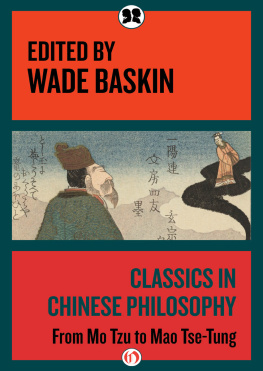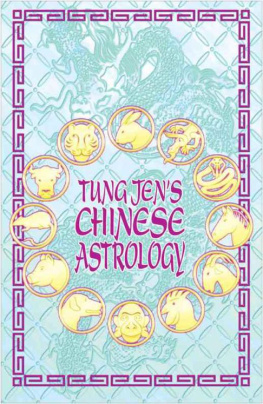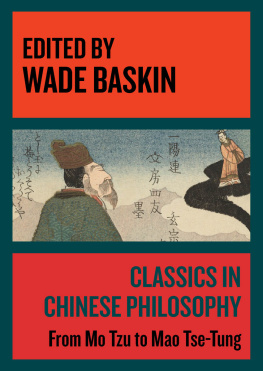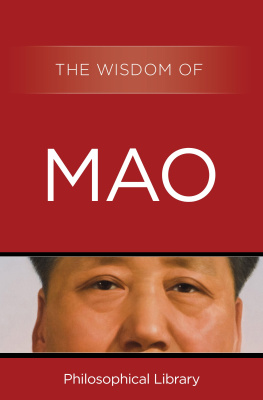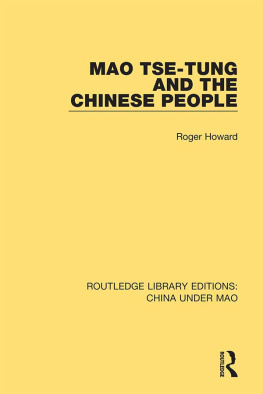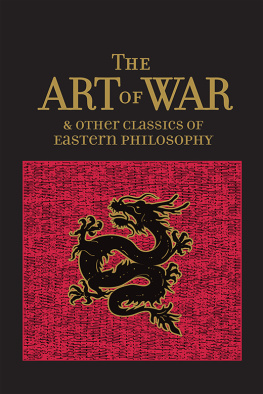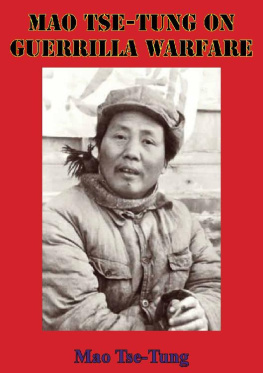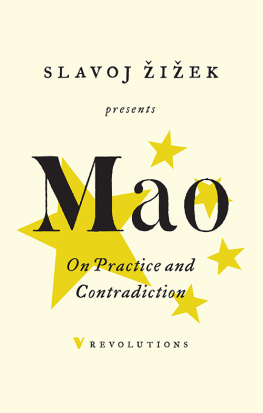Baskin - Classics in Chinese Philosophy: From Mo Tzu to Mao Tse-Tung
Here you can read online Baskin - Classics in Chinese Philosophy: From Mo Tzu to Mao Tse-Tung full text of the book (entire story) in english for free. Download pdf and epub, get meaning, cover and reviews about this ebook. City: New York, publisher: Philosophical Library;Open Road;Open Road Integrated Media, LLC, genre: Romance novel. Description of the work, (preface) as well as reviews are available. Best literature library LitArk.com created for fans of good reading and offers a wide selection of genres:
Romance novel
Science fiction
Adventure
Detective
Science
History
Home and family
Prose
Art
Politics
Computer
Non-fiction
Religion
Business
Children
Humor
Choose a favorite category and find really read worthwhile books. Enjoy immersion in the world of imagination, feel the emotions of the characters or learn something new for yourself, make an fascinating discovery.
- Book:Classics in Chinese Philosophy: From Mo Tzu to Mao Tse-Tung
- Author:
- Publisher:Philosophical Library;Open Road;Open Road Integrated Media, LLC
- Genre:
- City:New York
- Rating:5 / 5
- Favourites:Add to favourites
- Your mark:
- 100
- 1
- 2
- 3
- 4
- 5
Classics in Chinese Philosophy: From Mo Tzu to Mao Tse-Tung: summary, description and annotation
We offer to read an annotation, description, summary or preface (depends on what the author of the book "Classics in Chinese Philosophy: From Mo Tzu to Mao Tse-Tung" wrote himself). If you haven't found the necessary information about the book — write in the comments, we will try to find it.
Baskin: author's other books
Who wrote Classics in Chinese Philosophy: From Mo Tzu to Mao Tse-Tung? Find out the surname, the name of the author of the book and a list of all author's works by series.
Classics in Chinese Philosophy: From Mo Tzu to Mao Tse-Tung — read online for free the complete book (whole text) full work
Below is the text of the book, divided by pages. System saving the place of the last page read, allows you to conveniently read the book "Classics in Chinese Philosophy: From Mo Tzu to Mao Tse-Tung" online for free, without having to search again every time where you left off. Put a bookmark, and you can go to the page where you finished reading at any time.
Font size:
Interval:
Bookmark:

PREFACE
During the last century China has undergone more change than during any other period in its long and often turbulent history. Roughly a quarter of the worlds population has been directly affected by the radical transformation that culminated in the establishment of the present Communist stateone which claims to have translated into reality the Confucian ideal of securing the equality of all men. In underdeveloped regions throughout the world, wherever the quest for social justice has been checked, millions of people have been indirectly affected by these changes. Western scholars, somewhat perplexed by what has already happened, are trying to determine the causes underlying the whole succession of events.
Believing that recent developments are best understood when viewed from a historical perspective, the editor of this work has tried to present in one volume a conspectus of the brilliant and many-sided development of Chinese philosophy.
The study of Chinese philosophy has been severely restricted by the difficulties of the classical literary style and, until recently, by the absence of reliable translations. Problems of terminology abound because the same Chinese term is translated differently in the works of different philosophers. I have endeavored in the introductory statement preceding each selection to help the reader to cope with these lexical problems. By adopting a chronological arrangement of the materials and calling attention to interlinking developments, I hope to have provided the reader with a practical means of familiarizing himself with the most important documents of the cultural heritage of China, the cradle of the worlds oldest civilization, from the Confucian Analects to the theoretical statements of Mao Tse-tung.
W. B.
I Ching (Book of Changes) is one of the Confucian classics. Though some of the commentaries now included in I Ching (also called Y King) have been ascribed to him, Confucius claimed that he had simply collected the materials that make up this work and the five other works representing the Chinese legacy. Legend ascribes the eight trigrams from which the whole system of I Ching was developed to Fu Hsi (2953-2838 B.C. ), the first of the Five Emperors, the sixty-four hexagrams to King Wn (r. 1171-1122 B.C. ), and the explanatory texts to Duke Ku (d. 1094 B.C. ). Fu Hsi is said to have constructed his trigrams from the markings on the back of a tortoise. The seven commentaries that follow the hexagrams and the explanatory texts, though attributed to Confucius, are probably the work of many hands over a considerable period of time, from as early as the sixth century B.C. to the third century B.C. IChing has the distinction of being a work cherished not only by Confucianists but also by Taoists.
Each of the sixty-four hexagrams has a name and is formed by two trigrams, each consisting of three lines, divided or undivided. These hexagrams relate to the ancient practice of divination based on the markings on burned tortoise shells, and in later, more simplified procedures, on prescribed arrangements of milfoil stalks. The cryptic texts that follow each hexagram yield no definite philosophical conclusions but enabled commentators to trace the outline of a rational approach to a dynamic universe. A divided line represents the weak principle of the universe (yin), an undivided line, the strong principle (yang).
I Ching had a powerful impact on Neo-Confucians, who quoted it frequently and wrote commentaries on it. The ancient work is said to have intrigued Confucius and to have exerted more influence on philosophy than any other Confucian classic. C. G. Jung and Hermann Hesse, like many other twentieth-century thinkers, testify to its enduring appeal.
Classics in Chinese Philosophy
From Mo Tzu to Mao Tse-Tung
Edited by Wade Baskin

CONTENTS
Thanks are due to Professor Jung Young Lee, of
the University of North Dakota, for kindly assisting
in checking proofs and text.
The Teachings of the Master
From The Confucian Analects, translated by William Jennings, London, George Routledge & Sons Limited, 1895.
ADVANTAGE, DESTINY AND DUTY
(5)
1. Topics on which the Master rarely spoke wereAdvantage, and Destiny, and Duty of man to man.
2. A man of the village of Tah-hiang exclaimed of him, A great man is Confucius!a man of extensive learning, and yet in nothing has he quite made himself a name!
The Master heard of this, and mentioning it to his disciples he said, What then shall I take in hand? Shall I become a carriage-driver, or an archer? Let me be a driver!
3. The (sacrificial) cap, he once said, should, according to the Rules, be of linen; but in these days it is of pure silk. However, as it is economical, I do as all do.
The Rule says, Make your bow when at the lower end of the hall; but nowadays the bowing is done at the upper part. This is great freedom; and I, though I go in opposition to the crowd, bow when at the lower end.
4. The Master barred four (words);he would have no shalls, no musts, no certainlys, no Is.
5. Once, in the town of Kwang, fearing (that his life was going to be taken), the Master exclaimed, King Wn is dead and gone; but is not wn with you here? If Heaven be about to allow this wn to perish, then they who survive its decease will get no benefit from it. But so long as Heaven does not allow it to perish, what can the men of Kwang do to me?
6. A high State official, after questioning Tsz-kung, said Your Master is a sage, then? How many and what varied abilities must be his!
The disciple replied, Certainly Heaven is allowing him full opportunities of becoming a sage, in addition to the fact that his abilities are many and varied.
When the Master heard of this he remarked, Does that high official know me? In my early years my position in life was low, and hence my ability in many ways, though exercised in trifling matters. In the gentleman is there indeed such variety (of ability)? No.
(From this, the disciple) Lau used to say, Twas a saying of the Master: At a time when I was not called upon to use them, I acquired my proficiency in the polite arts.
7. Am I, indeed, said the Master, possessed of knowledge? I know nothing. Let a vulgar fellow come to me with a question,a man with an emptyish head,I may thrash out with him the matter to end, and exhaust myself in doing it.
8. Ah! exclaimed he once, the phoenix does not come! and no symbols issue from the river! May I not as well give up?
9. Whenever the Master met with a person in mourning, or with one in full-dress cap and kirtle, or with a blind person, although they might be young persons, he would make a point of rising on their appearance, or, if crossing their path, would do so with quickened step!
10. Once Yen Yen exclaimed with a sigh, (with reference to the Masters doctrines), If I look up to them, they are ever the higher; if I try to penetrate them, they are ever the harder; if I gaze at them as if before my eyes, lo, they are behind me!Gradually and gently the Master with skill lures men on. By literary lore he gave me breadth; by the Rules of Propriety he narrowed me down.When I desire a respite, I find it impossible; and after I have exhausted my powers, there seems to be something standing straight up in front of me, and though I have the mind to make towards it I make no advance at all.
Font size:
Interval:
Bookmark:
Similar books «Classics in Chinese Philosophy: From Mo Tzu to Mao Tse-Tung»
Look at similar books to Classics in Chinese Philosophy: From Mo Tzu to Mao Tse-Tung. We have selected literature similar in name and meaning in the hope of providing readers with more options to find new, interesting, not yet read works.
Discussion, reviews of the book Classics in Chinese Philosophy: From Mo Tzu to Mao Tse-Tung and just readers' own opinions. Leave your comments, write what you think about the work, its meaning or the main characters. Specify what exactly you liked and what you didn't like, and why you think so.

